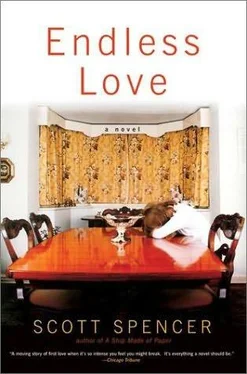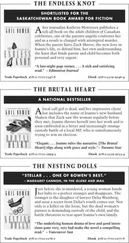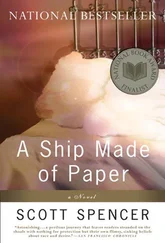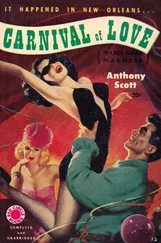There’s nothing I really need to say about life in Volkshill. The fear was constant: even the depths of boredom and the mock heights of cynicism were laced with fear. The anonymity was crushing: you could be beaten to death, you could choke on a piece of pork, your brain could explode and no one would care—and perhaps no one would know.
It was my understanding that in less than six months I’d be out of prison, at which time I would not, of course, be free, but would be subject to some alternate, more lenient punishment. This should have made my situation infinitely more tolerable. Nevertheless, I wasn’t equal to it. Though I believed that each day was bringing me nearer to the time when my case would be handled with more mercy, the days themselves, even as they passed, were intolerable: I felt like someone who has been swept out to sea by an undertow; each wave that rolls toward the shore only draws you further away.
I began to see everything through a haze, as real and disorienting as a thick morning fog. There was an accompanying loss of body awareness so that as the world outside of me became less real my own reality decreased as well. My dreams were so vivid and lifelike that I hardly thought of them, and in the midst of my slow, careful prison day there wouldn’t have registered the slightest surprise in me if someone had grabbed my shoulder and shaken me awake. My appetite disappeared; sometimes the aroma of food—not to mention the sight of it—would cause a violent revulsion in me. I developed a limp; my hearing deteriorated. I talked to myself—at first, just to keep things organized, to remind myself of this or that, but then it became a habit and when someone would lean into my blurry line of vision and say, “Why don’t you shut your fucking face?” I’d be surprised that I’d been at it again, or else I’d have no idea what they were complaining about. This led to an enormous sense of persecution—really, everything started to go. The world an inch out of orbit can end all life. I could not adapt; I couldn’t recoup any losses; I only got worse. Every now and then in a moment of woozy lucidity I’d tell myself that all the madness, all the physical symptoms, all the unreality were somehow a product of my will, that I could still, if I truly wanted to, take the reins of my life in hand again. But it was empty comfort. I told myself I wanted to spiral down into madness, but even at the fullest pitch of self-accusation (which was somehow linked to self-congratulation) I couldn’t see or even imagine an alternate mode of behavior.
Rose and Arthur came to visit me in the humanely informal visitors’ room—shiny geometric wallpaper, orange plastic bucket seats, Formica-covered tables around which families could huddle, a portable Panasonic tuned to the local pop music station supplying the background noise. I don’t know what I said or how I carried myself but I made it clear that I was eroding and soon they increased their efforts to have me transferred out of jail and into a hospital. They spent money they couldn’t afford to keep the pressure on the state, and three months into my stay at Volkshill I was suddenly placed in the infirmary for psychiatric observation. I took the familiar tests and was interviewed by a pair of prison psychiatrists—first a Dr. Hillman, who looked like a big pink friendly animal in a children’s book, and then by Dr. Morris, a young black doctor with an Afro and some kind of enormous fang hanging near his throat. I said whatever popped into my mind, with the objectivity of someone calling numbers at a bingo game. I felt under no obligation to answer their questions or follow instructions and in the end they both agreed that my psychological state was in critical disarray. They recommended I be placed in a state institution, and that’s exactly where I would have been sent if I hadn’t had parents who were willing to struggle for a better alternative and were willing to pay for it. And so on January 15, 1974, I was transferred back to Wyon, Illinois, and readmitted to Rockville Hospital. I was delivered in a police car, sitting in back with a middle-aged prison official who didn’t say one word to me for the entire journey. We ran into a snow squall and had to stop for new windshield-wiper blades. I was freezing cold, shivering; I kept my fingers tucked under my arms. The stubble in the cornfields looked like a world in ruins.
After Volkshill, it was a relief to be back at the hospital. The symptoms I’d been accumulating in prison gradually receded, but I was always in anticipation of their return. Sometimes in the middle of the night I would wake for no apparent reason and not know exactly where I was, and this momentary confusion would frighten me into believing that everything was falling apart again. And then talking to Dr. Clark—trying to be open now, believing I needed help—I’d sometimes burst into sobs that had no obvious relationship to what we were discussing and these sobs seemed to fill the sails of my turmoil and send me as far from shore as I was during the worst days at Volkshill. At first, Dr. Clark encouraged my crying, but I would be so affectless and withdrawn afterward that before long he did his best to intervene. He disapproved of drug therapy but he put me on Lithium. I always had a bad taste in my mouth and I began taking two-hour naps in the middle of the afternoon, but my moods leveled out and I was glad for that.
Whereas my first stay had passed with my anonymity virtually intact, the second time around virtually everyone knew my name. I wasn’t one of those natural leaders and no one looked to me as the vanguard in the eternal struggle between patients and staff—which of course existed even in a genteel asylum. I was liked because I was older, knew the ropes, and because I was given more responsibility than others were. When new patients checked in, it was I who gave them the second-day tour around Rockville. I was like a failed career officer, soft and toothless, with a yarn or two and a shoulder to cry on. I couldn’t fail to notice that whenever someone really was at odds with the Rockville staff, they turned on me as well.
I learned how to use a Super-8 movie camera and a simple editing machine, and before long I was the all but official filmmaking instructor. We did the ordinary, expected things: movies of people jumping up and down, zoom shots, slow motion, Keystone Kop parodies. I co-scripted a twenty-minute movie we called The Attack of the Gigantic Mommy, in which we photographed a patient named Sally Walsh from below a glass table, where she stood surrounded by tiny trees and cows, such as decorate the domain of a Lionel. I’m sure it was terribly therapeutic for all involved. Also to my credit: when Mitzi Pappas freaked out on some LSD her eyebrowy brother smuggled in to her, it was against me she huddled for comfort; when Myron Friedman stood perched on the verge of suicide (or, more likely, compound fracture), it was me who got him off the fourth-floor ledge with the slogan: “Myron, on my hands and knees I beg you to get your skinny white ass inside!”; and when dreamy Michael Massey failed to return from a group outing into Wyon, Dr. Clark appointed me a member of the five-man search party even though I was still strictly forbidden to leave the Rockville grounds, and it was I who found Michael, staring into his hands in the back yard of a boarded-up house.
On June 3, 1974, a letter arrived for me, and it was from Jade. It was given to me by Dr. Clark after a session in his office. “I’m not going to lie to you,” he said. “It came yesterday and I read it. I gave myself a night to decide whether or not to give it to you and—well, here it is.”
Dear David,
I’m still in Stoughton, but not in school and not living at Gertrude anymore. Except to move my things out, I haven’t been back to the old house since the day. I live on the second floor of that little green and white house near the North Stoughton post office. It’s a little too large for one person but it gives me all the privacy I need. I suspect you may raise your eyebrows, but I’ve learned some meditation techniques. Keith learned them from a guy he works with and we all share the same mantra, which is the words you say to yourself when you are beginning your meditation. It’s marvelous how fifteen or twenty minutes of sitting and breathing can make you feel so renewed. Now that I’m a College Graduate, I am using my expensive education by working as a salesgirl at Stoughton Stoneware. It’s a wonderful job in some ways because I think their stuff is so great—I’ve got enough “seconds” to make a service for forty-eight—but it’s exhausting being on my feet all day and putting up with customers, many of whom treat me as if I were their personal servant.
Читать дальше












